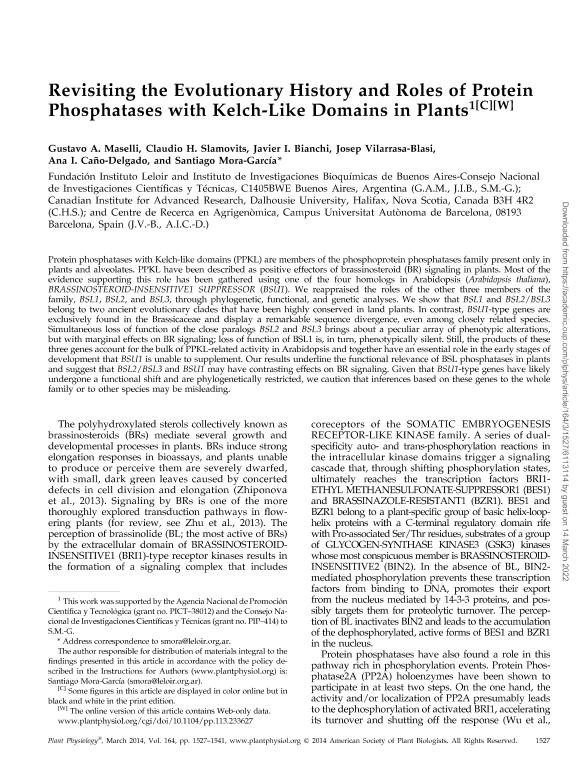Artículo
Revisiting the evolutionary history and roles of protein phosphatases with Kelch-like domains in plants
Maselli, Gustavo Ariel ; Slamovits, Claudio H.; Bianchi, Javier Ignacio
; Slamovits, Claudio H.; Bianchi, Javier Ignacio ; Vilarrasa Blasi, Josep; Caño Delgado, Ana I.; Mora Garcia, Santiago
; Vilarrasa Blasi, Josep; Caño Delgado, Ana I.; Mora Garcia, Santiago
 ; Slamovits, Claudio H.; Bianchi, Javier Ignacio
; Slamovits, Claudio H.; Bianchi, Javier Ignacio ; Vilarrasa Blasi, Josep; Caño Delgado, Ana I.; Mora Garcia, Santiago
; Vilarrasa Blasi, Josep; Caño Delgado, Ana I.; Mora Garcia, Santiago
Fecha de publicación:
03/2014
Editorial:
American Society of Plant Biologist
Revista:
Plant Physiology
ISSN:
0032-0889
e-ISSN:
1532-2548
Idioma:
Inglés
Tipo de recurso:
Artículo publicado
Clasificación temática:
Resumen
Protein phosphatases with Kelch-like domains (PPKL) are members of the phosphoprotein phosphatases family present only in plants and alveolates. PPKL have been described as positive effectors of brassinosteroid (BR) signaling in plants. Most of the evidence supporting this role has been gathered using one of the four homologs in Arabidopsis (Arabidopsis thaliana), brassinosteroid-insensitive1 suppressor (BSU1). We reappraised the roles of the other three members of the family, BSL1, BSL2, and BSL3, through phylogenetic, functional, and genetic analyses. We show that BSL1 and BSL2/BSL3 belong to two ancient evolutionary clades that have been highly conserved in land plants. In contrast, BSU1-type genes are exclusively found in the Brassicaceae and display a remarkable sequence divergence, even among closely related species. Simultaneous loss of function of the close paralogs BSL2 and BSL3 brings about a peculiar array of phenotypic alterations, but with marginal effects on BR signaling; loss of function of BSL1 is, in turn, phenotypically silent. Still, the products of these three genes account for the bulk of PPKL-related activity in Arabidopsis and together have an essential role in the early stages of development that BSU1 is unable to supplement. Our results underline the functional relevance of BSL phosphatases in plants and suggest that BSL2/BSL3 and BSU1 may have contrasting effects on BR signaling. Given that BSU1-type genes have likely undergone a functional shift and are phylogenetically restricted, we caution that inferences based on these genes to the whole family or to other species may be misleading.
Palabras clave:
Ppkl
,
Brassinosteroid
,
Signaling
,
Evolution
Archivos asociados
Licencia
Identificadores
Colecciones
Articulos(IIBBA)
Articulos de INST.DE INVEST.BIOQUIMICAS DE BS.AS(I)
Articulos de INST.DE INVEST.BIOQUIMICAS DE BS.AS(I)
Citación
Maselli, Gustavo Ariel; Slamovits, Claudio H.; Bianchi, Javier Ignacio; Vilarrasa Blasi, Josep; Caño Delgado, Ana I.; et al.; Revisiting the evolutionary history and roles of protein phosphatases with Kelch-like domains in plants; American Society of Plant Biologist; Plant Physiology; 164; 3; 3-2014; 1527-1541
Compartir
Altmétricas



